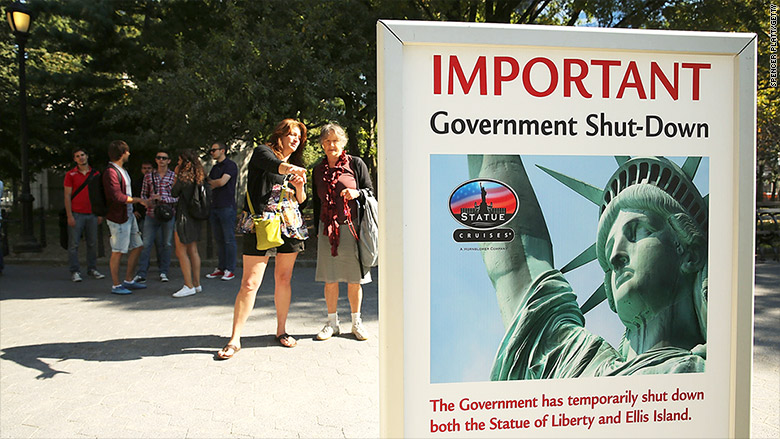
There's a real risk now that the federal government will shut down on October 1. Lawmakers are nowhere near settling their myriad disputes and agreeing to pass a budget.
A shutdown is generally a waste of valuable time and resources. Even the threat of a shutdown is a waste because of all the advanced planning required.
Among other things, federal agencies have to decide: Which workers should be furloughed? Which programs and offices should close completely and which must continue because they protect life and property? How and when should necessary information be disseminated to workers and the public?
Should a shutdown occur, it won't stop the mail from coming and it probably won't fell the U.S. economy, although it won't help it either.
But it would inconvenience Americans across the country and bite many whose personal economy in one way or another is tied to the federal government.
Here are just some of the folks who would get hit:
Federal employees: If the 2013 shutdown is any guide, more than 800,000 federal workers could be told not to come to work during a shutdown this year. And they will not be paid for that time unless Congress chooses to pay them retroactively when the government reopens, something that has happened in the past.
Those who are not furloughed will still be legally required to work, but they will not be paid until the shutdown is over.
In both cases, anyone who lives paycheck to paycheck will have a hard time making ends meet.
Related: McConnell readies plan to avert shutdown
In 2013, a majority of the members of the National Treasury Employees Union, which represents workers across 31 federal agencies and departments, were furloughed and were not paid during the shutdown. Many worried about being able to pay their bills, and some had to ask creditors for forbearance on the money they owed, said NTEU President Tony Reardon.
Though they ultimately were paid retroactively, the shutdown left them in a tough position financially.
"It's embarrassing. And it's the wrong thing for this country to do to its employees," Reardon said.
Members of the union he met with last week all expressed concerns about whether they'd be paid this time around, he said.
Job and grant applicants: Anyone applying for a job in the federal government or for a federal grant might want to start twiddling their thumbs. Typically the processing of applications isn't likely to occur until the shutdown ends.
Vacationers, travelers: Anyone planning a trip to Washington, D.C., or to any state with federally funded tourist attractions -- such as museums, national parks or monuments -- will be turned away from those sites because they almost certainly will be closed.
And if you're planning a trip abroad and need to renew your passport, you might experience delays if the U.S. passport office near you is located in a federal building, since that building may be closed.
Small business owners: Small businesses that rely on tourists and government workers for their livelihood could see a big drop-off in revenue during the shutdown.
That could include anyone from the owner of a store in a federal building, the lunch cart guy just outside of it, to the folks who run the rafting company near a national park.
Federal contractors, meanwhile, may experience project and payment delays if the agencies they work for can't issue the needed paperwork to move forward.
During the 2013 shutdown, there were more than 10,000 stop work orders issued, according to a report from the White House budget office. Beyond that, there was a lot of confusion over whether contract workers would be allowed to telecommute if the agency they worked for was shut down, said Stan Soloway, president of the Professional Services Council, which represents a large swath of government contractors.
Federal agencies' contingency plans in the event of a shutdown next week have not been made public yet. But the shutdown plans that took effect in 2013 might offer a pretty good sense of what's likely to occur.
